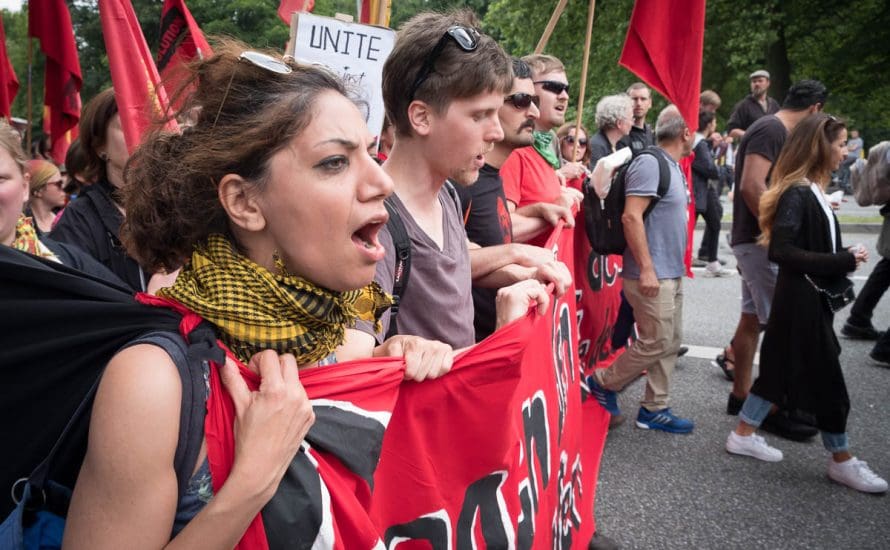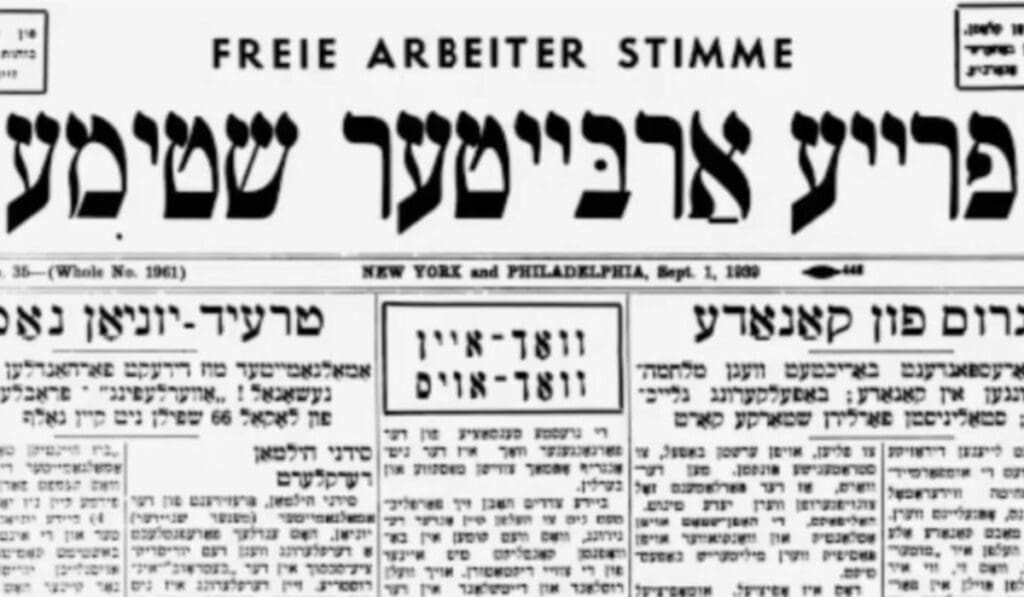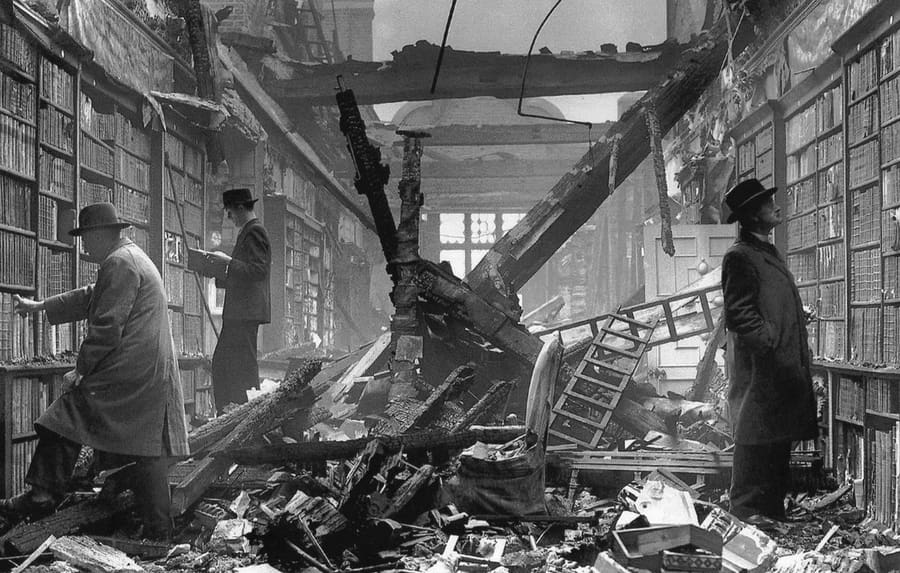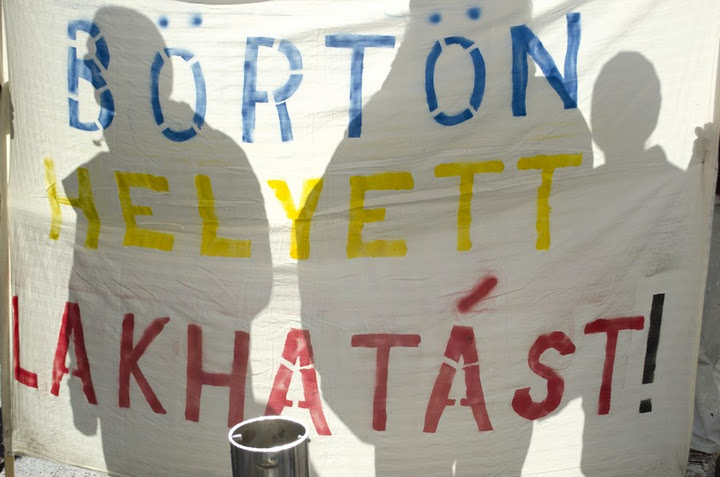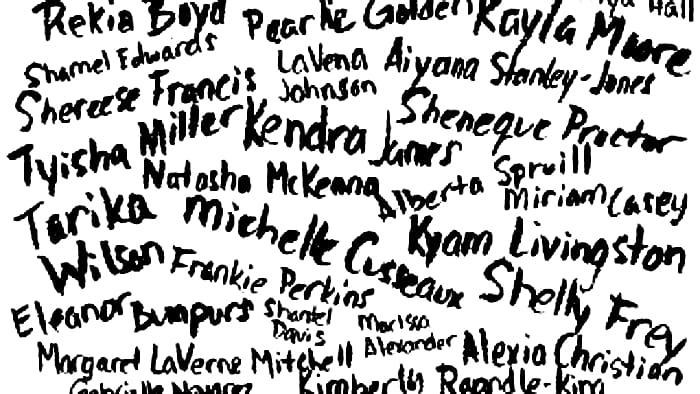Post-G20 Reflections: Nice Protests, Ugly Results
by Mina Khani for Klasse Gegen Klasse
22 July 2017 (original post in German)
The images of the hundreds of thousands of people who protested against the G20 summit in Hamburg display more than just the divide between rich and poor in Germany and worldwide. The images also made clear that many demonstrators are ready to stand up for their rights to the bitter end, even in the face of heavy police repression. Many of the moments captured by cameras in the anti-G20 protests are truly gripping.
Nonetheless, the protests a few weeks ago were still a puzzle for me. I wonder, for example, why our protests always take the same form, and why we seem to discover each time, as if for the first time, that we’re not getting anywhere this way. I don’t see any left “movement” constituted by the protests around the G20. A movement, after all, is only a movement if it can move itself and society. The radical left in Germany should gradually be starting to give this serious thought, because the important role of the German state in Europe—and also the world—means it could, potentially, move quite a bit more than it does.
The political content of our protests must be debated more energetically—and the content will in turn determine the form. If we aren’t getting anywhere with past forms of protest, then it is our duty to start thinking about why we ended up here. But this sort of discussion isn’t happening, or only within certain circles if it is. The protests in Hamburg were in some ways very moving; the images of so many people who won’t be manipulated by capitalism and neoliberalism, and who refuse to remain mere spectators of the myriad catastrophes of our time, were very encouraging.
But what comes after? If we as radical leftists only “make a mark” here and there every once in a while—bravely making repression more visible, in part through our own bodily sacrifice—but then just go back to our bourgeois lives a couple days later without having nudged a single stone in any particular direction, then how can we not, in retrospect, talk about a disappointing outcome and feel rather discouraged?
The absence of any representatives of the working class in these protests shows that although these protests had a very anti-capitalist character, there was little effort to weave the workers’ movement into them. Why is that? The workers’ movement has issues that are important to it which simply do not get noticed, much less taken up by the radical left—for example wage labor, the minimum wage, precarious working conditions, pensions, etcetera. Why aren’t these among our issues? Why does a major segment of the the radical left in Germany seem to just vicariously fight on behalf of migrants and refugees and then identify themselves, satisfied, as “antifascist”? Why isn’t class struggle important to them anymore?
These questions can only be answered if they are worked at within a revolutionary process. The radical left, therefore, needs to slowly begin to rediscover its revolutionary character whereby these questions can be carefully examined. In the words of Rudi Dutschke: “Revolution is not a singular act, where something happens and then everything is different. Revolution is a long and complicated road, where the person becomes different.”
There are material reasons for the divide between the radical left and the working class in Germany. Only a form of self-organization and self-critique that breaks through this divide and begins to address the relevant questions in a practical way can approach such a revolutionary character as Dutschke describes.
As an Iranian political refugee in Germany…
Outwardly, Europe trumpets the gospel of democracy, especially when it takes us in and recognizes us as “political refugees.” We are fleeing from countries in which simply organizing a rally can cost you your life—countries like Iran, Turkey, Afghanistan, Syria, Iraq, etcetera. The people in every one of these countries are suffering under various kinds of repression or war. And although many others flee these countries for reasons of instability and poverty, they are still ultimately here for political reasons. Wasn’t this summit supposed to be first and foremost about them? And where were they? Why weren’t they permitted to speak? Who represented them in these protests? Do they have a voice at all among us?
The Kurdish and Turkish blocs were there, of course. They are well organized, and perhaps because of their current and historical experiences in Turkey or Rojava/Bakur, they have more revolutionary spirit than many others. Do these experiences get exchanged, though? Where are recognizable connections being made between the struggle of progressive forces in Turkey and in the Kurdish regions with the protests here in Hamburg? What represents the “international” character of our protests?
The presence of migrants as an active part of self-organization is of course an expression of a segment of the German left. But the refugee issue still doesn’t get more visibly addressed, even despite their presence. For leftists here, is our being “welcome” as far as it goes for us as refugees?
What does it mean, in this context, to be a “political refugee”? Someone who was being persecuted for political reasons and therefore fled. I am one of these refugees. I have tried to make Germany my home, because my own home is too dangerous for me.
The repressions of the Islamic regime in Iran don’t exist in a vacuum, however. They operate, crucially, within the global political system we all find ourselves in. Iran has been under sanctions by the West for decades, under the pretext of “human rights.” The sanctions and saber-rattling don’t affect the government, though; much more than those in power, it is the population that suffers. The political situation in Iran has barely changed. But there is now a “nuclear deal” between the industrialized nations and Iran. The doors are open for new Western privatizations, and suddenly Iran has become a relatively “moderate” partner for the West. At the same time, Germany shows off us refugees: we are persecuted in our country, and here we receive “protection.” It’s a pretty good trick.
But this condition of powerlessness among refugees within and with regard to industrialized countries will only last as long as we don’t join the global struggle against capitalism from here, and as long as we don’t organize and mobilize against the injustices that originate here.
Of course, special measures are taken against us if we are photographed by the state apparatus, if we get searched, or if our names and addresses are recorded by the police. The dominant discourse says that it’s “cool and modern” to be against the Iranian regime here, but within the same context, protesting against the German state is criminalized. The Iranian state criminalizes its opponents also, if simply with other, more violent methods. Therefore I don’t want to draw a direct comparison; that would be absurd. But oppositional migrants are celebrated here and can move freely only so long as they move within the pro-Western and pro-capitalist political space. Otherwise we are “terrorists” or “troublemakers.”
Repression’s Democratic Face
And: Germany can be truly proud of its spiffy style of repression, because never once in Iran was it demanded of me during a search that I hand over my underwear. What kind of perverted fantasy prompts the law enforcement authorities in Hamburg to allow—or order—such a thing? Speaking more broadly, the police deployments in Hamburg in recent days showed (once again) that Western capitalism is ready to take off its democratic mask when it comes down to it. And the language of repression for “troublemakers” or the “radical left scene” also debuted some new jargon: now “left extremism” will be the permanent buzzword. The phrase “left fascism” was even getting tossed around.
The German state defines a couple thrown stones and pointless barricades as “terror,” and this terror must of course be “combated.” Best wishes and welcome, one and all, to reality. With that, we arrive back at our question: what do we need to change in ourselves in order to be capable, as anti-capitalist leftists, of moving something?
“Peaceful” is another word for “shitty.”
The state leaves us in a dilemma. We have to appear “peaceful” so that we will be more or less permitted to organize and mobilize ourselves. What “peaceful” means, though, is defined for us by the state and its repressive apparatus. According to their definition, police using water cannons on demonstrators is “peaceful” – meanwhile a mass of people merely moving in the direction of the summit is “violent.” According to their definition, police hitting demonstrators with batons is “peaceful” – meanwhile the human chains that these demonstrators formed are “violent.” According to their definition, the broken hands and bloody noses of demonstrators are a result of police “protection” – to cover your face, however, in order not to be photographed by the state apparatus, is “violent.” Stones and bottles thrown at armed police are a sign of “leftwing criminality,” but to divide the city into three zones and crack down with full force on anyone mobilizing against the G20 in any way is “peaceful.”
How long will we let ourselves be intimidated by state violence, all the while shouting, “We won’t be intimidated!”? Aren’t we actually somewhat worried what the rest of society thinks of us when we cling to the plea that we got permits for our protests and we were “peaceful”? Of course we are well within our rights to fairly criticize the approach of the autonomous left. But should we, in the face of this criticism, submit to dividing ourselves into the categories of “peaceful” and “violent” protesters? By engaging in this tactic, we contribute to the autonomous left’s being made a scapegoat, their being more and more criminalized, and more and more people therefore turning away from a more serious form of politicization. Are we not shoving them further into a corner, where they will get more and more identitarian?
The radical left needs to open a debate about repression, and about force and counterforce. Of course burning cars doesn’t accomplish anything when there’s no leftist strategy or tactic behind it. But distancing ourselves from that kind of activity without addressing the question of “violence” doesn’t accomplish anything either, and allows us only to be categorized as either “peaceful” or “criminal” demonstrators—which can only have negative consequences for all leftists in the long run.
Now What?
“We”—that is, those who think that the struggle against capitalism can only be successful if we are well-organized and our mobilizing is well thought-out—must develop strategies and tactics that strike at the entire system and not just its police apparatus. We have to call private property into question. And only the working class can do that, through strikes, factory occupations, and the democratic self-organization of companies, schools, universities, countries, and the world. We are all saying that repression and state violence are increasing in intensity—so that means we must develop new forms of resistance. That means we, as leftists in Europe and specifically in Germany, are in need of a new debate around the forms and contents of resistance.
I hope that we can show one another the way to this debate, develop it together, and find answers together. This constructive critique did not emerge from a vacuum either. It is part of many discussions in these days post-G20. Here’s the punchline, though: it has been “post-G20” for decades already. And it is clear that capital and empire will not sit back and watch our new organizations—which will have to have a steadfast revolutionary character—without doing anything. How can we discuss these and other contradictions that face us? And how can we turn this into action? These are, I think, important questions of our time.
Translated by Antidote
Featured image source: Klasse Gegen Klasse

